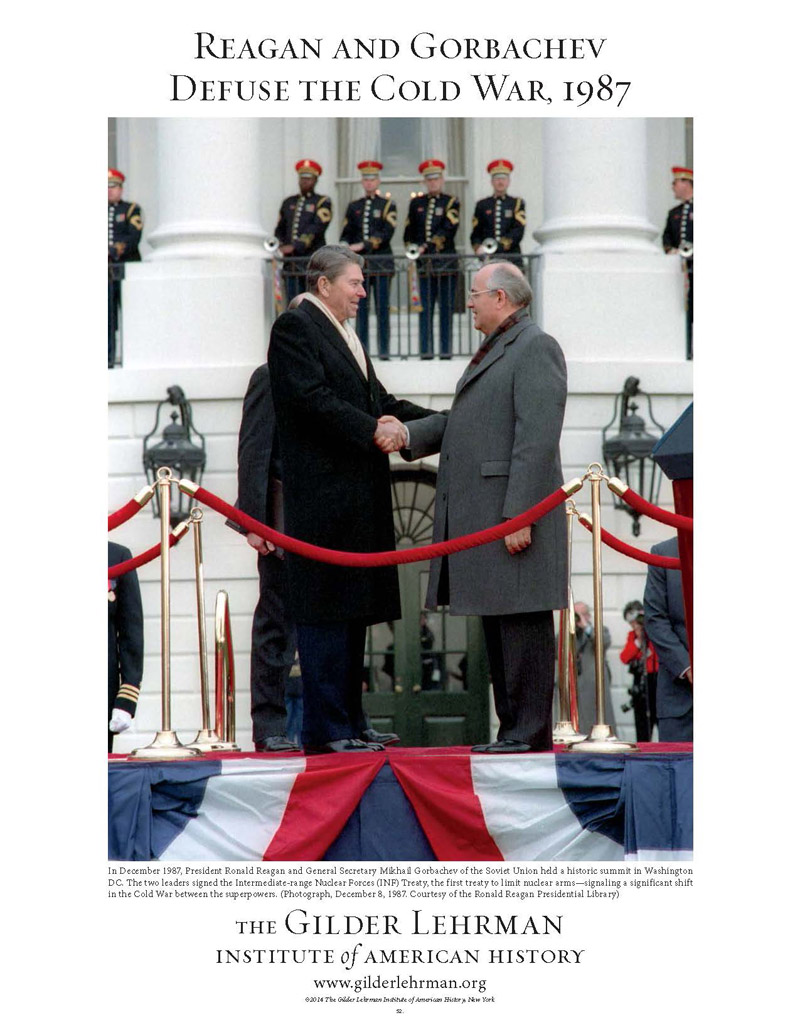American Foreign Policy in Relation to Former Soviet States: Teaching Resources from GLI
Posted by Gilder Lehrman Staff on Wednesday, 04/20/2022
 What has been the US position on involvement in the Soviet or former Soviet states, including in relationship to NATO?
What has been the US position on involvement in the Soviet or former Soviet states, including in relationship to NATO?
In what ways has US soft power and military power evolved, especially in relation to Russia?
What has been the effect of US foreign policy domestically and on the rest of the world?
To understand present crises and how the future might play out, historical context is vital.
We offer these resources to teachers, from primary source documents to relevant background reading and viewing from eminent scholars in the field:
America between the Wars
with Ukraine and World War I Background
 Professor Michael Neiberg, Chair of War Studies, US Army War College, and lead professor for the Gilder Lehrman MA Program courses on World War I and World War II, was joined by a panel of former MA Program students to discuss primary sources and methods they use in their classrooms for teaching the world wars, especially in relation to the current crisis in Ukraine, in a live Zoom event on April 25, 2022.
Professor Michael Neiberg, Chair of War Studies, US Army War College, and lead professor for the Gilder Lehrman MA Program courses on World War I and World War II, was joined by a panel of former MA Program students to discuss primary sources and methods they use in their classrooms for teaching the world wars, especially in relation to the current crisis in Ukraine, in a live Zoom event on April 25, 2022.
The entirety of the recorded event can be watched here.
Read Professor Neiberg’s April 8, 2022, essay connecting World War I and the war in Ukraine here.
Lesson Plans
 Lesson plans created in partnership with World101 from the Council on Foreign Relations:
Lesson plans created in partnership with World101 from the Council on Foreign Relations:
- “The Spirit of Empire”: America Debates Imperialism
- America’s Role in the World: World War I to World War II
- The Origins of US Cold War Fears, 1946–1961
- The Cold War as a Culture War: Visualizing Values and the Role of Pop Culture
From lesson plans in Gilder Lehrman History Resources:
Cold War Video Resources
- The Origins of the Cold War, a lecture by John Lewis Gaddis (Yale University)
- The Cold War, taught in four class sessions for Gilder Lehrman History School by 2019 History Teacher of the Year Joe Welch
- The Global Cold War taught by Daniel Jocz
For lecture 1 of the above series, please consult the following resources:
- Newsmap, vol. 1, no. 15 (August 3, 1942). National Archives at College Park, Record Group 26: Records of the U.S. Coast Guard, 1785–2005. https://catalog.archives.gov/id/66395023
- Potsdam Big Three Conference, July 1945. National Archives at College Park, Record Group 428: General Records of the Department of the Navy, 1941–2004. https://catalog.archives.gov/id/80182
- Japan Surrenders. National Archives at College Park, Record Group 208: Records of the Office of War Information, 1926–1951. https://catalog.archives.gov/id/39075
- Sarah Pruitt, “The Hiroshima Bombing Didn’t Just End WWII – It Kick-Started the Cold War,” History, December 19, 2018, https://www.history.com/news/hiroshima-nagasaki-bombing-wwii-cold-war
- “The Eastern Front,” The National WWII Museum, https://www.nationalww2museum.org/war/articles/eastern-front
Primary Source Documents from the Gilder Lehrman Collection

- Theodore Roosevelt on the sinking of the Lusitania, 1915
- Emma Goldman on the restriction of civil liberties, 1919
- Treaty of Versailles and President Wilson, 1919 and 1921
- Physicists predict a nuclear arms race, 1945
- Anti-Communist Trading Cards, 1951
- The Cold War in the classroom, 1952
- JFK on the containment of Communism, 1952
- John Kennedy compares US and Soviet military power, 1953
- Ronald Reagan on economics and political parties, 1962
- Robert F. Kennedy on Vietnam, 1967
- The United Nations and the international community, 1967
- The end of the Vietnam War: conscience, resistance, and reconciliation, 1973
- Reagan Speech: “Tear down this wall,” 1987

Recommended Books
- Cathal J. Nolan, The Allure of Battle: A History of How Wars Have Been Won and Lost (2017 Gilder Lehrman Prize for Military History winner)
- M.E. Sarotte, Not One Inch: America, Russia, and the Making of Post–Cold War Stalemate
- See Mary Sarotte’s Gilder Lehrman Book Breaks talk here.
Please note that the Institute receives an affiliate commission from every purchase made through the links provided above.
History Now and Other Essays
- Jeremi Suri, “Henry Kissinger and American Foreign Policy”
- Michael Flamm, “Facing the New Millennium”
- Elizabeth Edwards Spalding, “Truman and His Doctrine: Revolutionary, Unprecedented, and Bipartisan”
Other Resources from Gilder Lehrman Partners
- RetroReport’s Understanding the Cold War in Latin America
- World101: US Foreign Policy, from the Council on Foreign Relations
- Resources on Ukraine from New American History’s blog Bunk
- “How Crimea’s Complex History with Russia Dates Back to the 19th Century” from HISTORY
For some of these links, you may need to be a subscriber on our site. To log in or start the subscription process, please click here. If you are a K–12 educator who has not yet claimed your free subscription to History Resources, History Now or Book Breaks, please click here to subscribe. Note that access to our site is free for K–12 students and teachers in our Affiliate School Program.